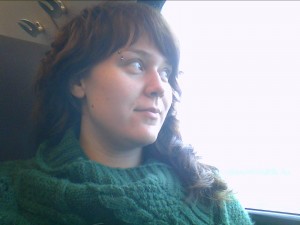
Essi Mäkelä, PhD Candidate University of Helsinki, is working on her thesis on registering of new and Pagan religious communities. She wrote her MA thesis (2012) on Discordianism within the theoretical framework of “Liquid Religion”. New religious movements and especially Discordianism are her special interests. She is also working on the Finnish translation of the Discordian book Principia Discordia."She is also the author of the Religious Studies Project Feature, Finding religiosity within a parody.
Various new religious movements seek to establish a presence in politics through challenging the hegemony of traditional churches in a very peculiar way. Postsecular, like postmodern, is a title applied to phenomena in society that do not seem fit into an earlier paradigm and has thus been named post-something because it perhaps is not yet visible what comes next. It is an end of an era but also a shift towards another and has the academic world digging out all the blind spots of the earlier theories,...
It's time for another RSP roundtable, folks. Thanks very much to Liam for facilitating this, and to Angus, Essi, George and Hanna for joining him for a stimulating discussion. This year scholars from across the globe gathered in the city of Groningen in the north-west of the Netherlands...
"In a way, when registering themselves, non-institutional religious groups take a step toward being more institutional and possibly even hierarchical – even if there is not much of hierarchy within the group to begin with." In the podcast Suzanne Owen refers to the Druidry's manifold self-identification situation. It seems to me this is a wide-spread phenomenon where there are conflicting ideas about how 'religion'...
A parody of religion will include elements that are accepted as religious within the society. This makes sure the parody is recognized as being targeted towards religion. Hence, a parody of religion will tell us what is accepted as a legitimate part of religion in the society where a parody or a joke on religion would be at home. Intuitively this includes nonreligious, ...
This work is licensed under a Creative Commons Attribution- NonCommercial- NoDerivs 3.0 Unported License.
The views expressed in podcasts, features and responses are the views of the individual contributors, and do not necessarily reflect the views of The Religious Studies Project or our sponsors. The Religious Studies Project is produced by the Religious Studies Project Association (SCIO), a Scottish Charitable Incorporated Organisation (charity number SC047750).